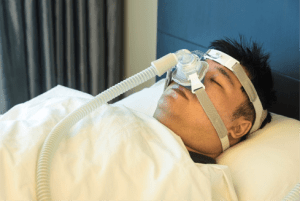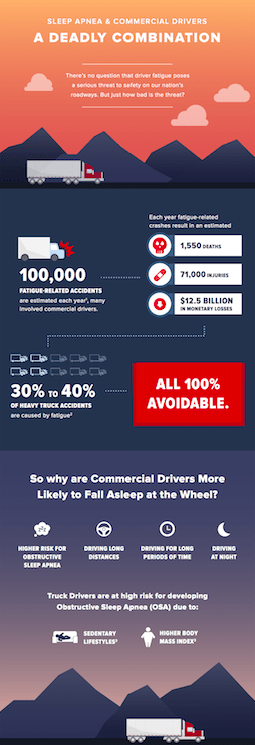There’s no question that driver fatigue poses a serious threat to safety on our nation’s roadways.
But just how bad is the threat? Well, according to the National Highway Traffic Safety Administration (NHTSA), the number of fatigue-related crashes reported to the police each year stands at a staggering 100,000, many of which involve professional drivers in heavy commercial vehicles.
That means an average of 1,550 deaths, 71,000 injuries and $12.5 billion in monetary damages each year as a result of fatigue-related accidents.
And the worst part is, they are all 100% avoidable.
So what is being done to prevent fatigued commercial drivers—specially licensed, professional operators of 18 wheelers, buses and other large commercial vehicles—from getting behind the wheel while they’re tired or fatigued?
As it turns out, not enough.
Federal Motor Carrier Safety Regulations and Sleep Apnea
According to the Federal Motor Carrier Safety Regulations, specifically § 392.3 on ill or fatigued operators:
No driver shall operate a commercial motor vehicle, and a motor carrier shall not require or permit a driver to operate a commercial motor vehicle, while the driver’s ability or alertness is so impaired, or so likely to become impaired, through fatigue, illness, or any other cause, as to make it unsafe for him/her to begin or continue to operate the commercial motor vehicle.
That means both drivers and their companies have a legal responsibility to make sure that anyone suspected of Obstructive Sleep Apnea, or other similar condition, stays off of the road.
Recent developments in the law have witnessed the implementation of a number of “improvements,” including Hours of Service (HOS) regulations, intended to help drivers get more rest during the work week. Unfortunately, according to the Insurance Institute for Highway Safety (IIHS), the new rules have done nothing to improve safety as they provide no means to effectively monitor hours spent driving.
Why are Commercial Drivers More Likely to Fall Asleep at the Wheel?
According to the NHTSA, because commercial drivers are generally required to drive long distances for long periods of time, often at night, they are generally more susceptible to falling asleep behind the wheel than non-commercial drivers. Disturbingly, research from the National Transportation Safety Board (NTSB) has confirmed that fatigue was the most frequently cited cause of heavy truck accidents, accounting for 30-40% of them, and was also the cause of 31% of the 182 fatal-to-the-truck-driver accidents studied.
Due to sedentary lifestyles and a tendency toward a high Body Mass Index (BMI), commercial drivers are at greater risk than non-commercial drivers of developing dangerous sleep disorders, including Obstructive Sleep Apnea (OSA)—a condition that causes breathing to stop and start repeatedly throughout the night due to upper airway constriction.
These constant interruptions in breathing make deep sleep almost impossible and inevitably lead to chronic fatigue. While commercial truck drivers are required by the Federal Motor Carrier Safety Administration (FMCSA) to undergo regular medical exams to spot dangerous medical conditions like these, many sleep disorders still go undiagnosed, or worse—ignored.
Sleep Deprivation and the Human Body
When the human body is deprived of sleep, cognitive performance begins to suffer almost immediately. Sleep deprivation problems will include:
- A Decrease in Alertness and an Inability to Perform;
- Cognitive as well as Memory Difficulties; and
- An Increased Risk of Involvement in a Motor Vehicle and/or Workplace Accident.
$6 Million Settlement with Transportation Company After Obtaining Court Order that Required Driver to Undergo Obstructive Sleep Apnea Testing

After a commercial truck driver fell asleep at the wheel, flipped the truck, and severely injured our clients, Ryan Zehl filed a lawsuit and, for the first time in Texas history, forced the driver to obtain a court-ordered sleep study, which, as suspected, proved that the driver was disqualified from driving because he had severe obstructive sleep apnea.
Through the driver’s medical records, we learned that, just months before the crash, a physician had notified the trucking company that they suspected the driver of having Obstructive Sleep Apnea and recommended that the company send the driver in for a polysomnography (an overnight sleep study).
Despite these serious red flags, the company failed to have the sleep study done and, instead, allowed the driver to continue driving its trucks on roads and highways across the country.
The Result: the driver fell asleep at the wheel and seriously injured our clients and a number of other drivers and passengers on the road.
If you or a loved one have been injured by a Texas truck accident, contact our experienced Houston truck accident attorneys near you today.
Our Undefeated Truck and Bus Accident Lawyers Obtained the First Ever Court-Ordered Sleep Study of a Commercial Driver
Several weeks before trial, we negotiated a $6 Million settlement on behalf of our clients, making it the largest settlement in the company’s history and the first time that a commercial driver had been ordered to undergo an overnight sleep study by a Texas court of appeals.
Risk Factors Associated with Sleep Apnea

Obstructive Sleep Apnea, the most common form of sleep apnea, is a condition in which the upper respiratory system intermittently constricts to block the flow of oxygen into the lungs. This constriction forces the body to work hard in order to breathe and, consequently, causes the body to shift from deep, restful sleep to light sleep in order to bring air in. This lack of sleep tends to accumulate until individuals start to operate with a significant sleep deficit.
While individuals of all ages can develop sleep apnea, common sleep apnea risk factors include:
- Obesity/High Body Mass Index (BMI);
- Heavy Snoring;
- Large Neck Circumference;
- High Blood Pressure;
- Diabetes;
- Male;
- Middle to Older Age;
- Smoking;
- Alcohol or Sedative Use;
- Difficulty Breathing Through the Nose
Contact Our Undefeated Truck and Bus Accident Lawyers for a Free Consultation at 1-888-603-3636 or by Clicking Here
In addition to recovering over $1 Billion for accident victims across the country, our truck accident attorneys have recovered the largest verdicts and settlements in history for truck, bus and 18-wheeler accident victims.
Call 1-888-603-3636 or Click Here to send us a confidential email through our Contact Form.
All consultations are free, and you won’t pay us a dime unless we win your case.
